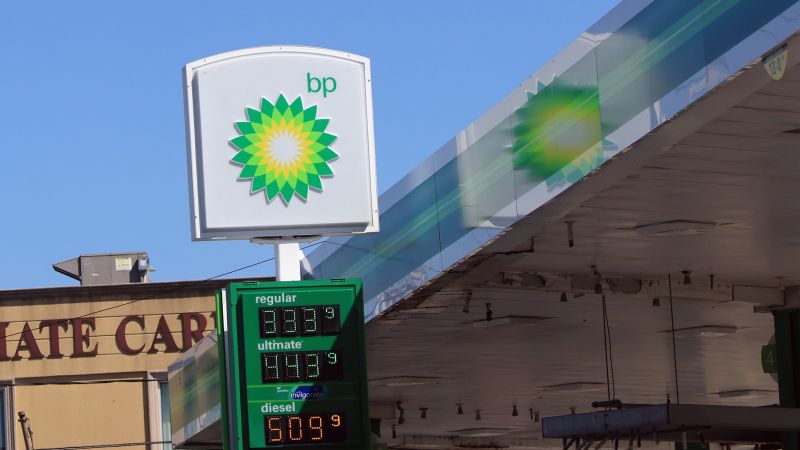BP announces $2.5 billion share buyback after profit soars | CNN Business
London
CNN Business
—
BP’s profit more than doubled in the third quarter of the year, extending a bumper run of earnings for the world’s biggest oil and gas companies that will add to growing calls in Britain and the United States for higher taxes on windfall profits.
The UK-based energy company posted underlying profit of $8.15 billion in the July to September period, compared with $3.3 billion a year ago. Earnings were boosted by “exceptional” results in gas trading, BP said in a statement on Tuesday.
The result means that Big Oil — BP
(BP), Shell, Total
(TOT)Energies, ExxonMobil and Chevron
(CVX) — has made more than $58 billion in profits for the third quarter alone. The record earnings come as growing numbers of households in Europe and North America are squeezed by decades-high inflation driven by spiraling energy and food bills.
Shareholders, meanwhile, are benefiting handsomely. BP said it would use surplus cash to buy back shares worth $2.5 billion, bringing total share buybacks this year to $8.5 billion. Shell has spent $18.5 billion on share buybacks this year, and made juicy dividend payments on top of that.
“We remain focused on helping to solve the energy trilemma — secure, affordable and lower carbon energy,” BP CEO Bernard Looney said in a statement. “We are providing the oil and gas the world needs today, while at the same time, investing to accelerate the energy transition,” he added.
Energy companies have posted record profits this year off the back of soaring oil and natural gas prices linked to Russia’s war in Ukraine.
Last week, Shell reported profit of more than $30 billion for the first nine months of the year — 58% more than it recorded for the whole of 2021 while ExxonMobil set a profit record for the second straight quarter.
The unprecedented set of earnings is fueling renewed calls in Britain and the United States for windfall taxes on energy companies to help households that are struggling to pay rising bills.
On Monday, President Joe Biden accused energy companies of “war profiteering” and said if they didn’t “act beyond their narrow self interest” and “give the American people a break” they would pay “‘a higher tax on their excess profits and face higher restrictions.”
Biden did not explicitly endorse a windfall tax and the specifics of what he would consider are likely to remain vague, but key congressional Democrats have pushed different windfall tax proposals targeting oil companies for more than a year.
In the United Kingdom, Ed Miliband, the opposition Labour Party’s spokesperson on climate change, said on Twitter that BP’s profits are “damning evidence” of the failure of the ruling Conservative Party to levy “a proper windfall tax.”
Miliband said last week that Shell’s gigantic quarterly profit was “further proof that we need a proper windfall tax to make the energy companies pay their fair share.”
The UK government introduced a £5 billion ($5.8 billion) tax on the windfall profits of oil and gas companies in May but has so far rejected calls to extend it, although Finance Minister Jeremy Hunt has said he’s not opposed in principle and that nothing is off the table. EU governments, on the other hand, agreed a windfall tax in September that they hope will raise $140 billion.
Shell CEO Ben Van Beurden, who will step down at the end of this year, told journalists last week that the industry should engage with officials to ensure these taxes are well designed.
“We should prepare and accept that our industry will be looked at for raising taxes in order to fund transfers to those who need it most in these difficult times,” he said.
BP said that it expects oil prices to remain elevated in the fourth quarter due to the recent OPEC+ supply cut and “ongoing uncertainty associated with Russian oil exports.” It also expects gas prices to remain “elevated and volatile” due to a lack of supply in Europe “with the outlook heavily dependent on Russian pipeline flows or other supply disruptions.”
Saudi Aramco, the world’s largest oil and gas company, posted a 39% year-on-year gain in third quarter profit to $42.4 billion on Tuesday.
“While global crude oil prices during this period were affected by continued economic uncertainty, our long-term view is that oil demand will continue to grow for the rest of the decade given the world’s need for more affordable and reliable energy,” CEO Amin H. Nasser said in a statement.
— Phil Mattingly, Betsy Klein, Nikki Carvajal and Maegan Vazquez contributed reporting.




